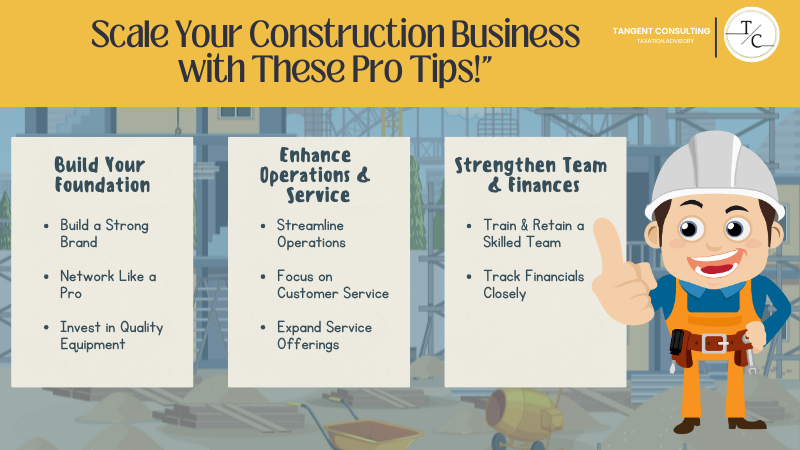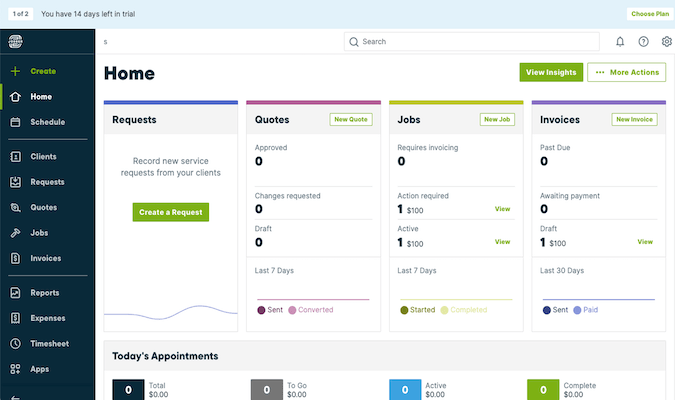8 Easy Tips on How to Scale a Construction Business
8 Easy Tips on How to Scale a Construction Business

It was a warm Monday morning when Ryan, the owner of Batcave Construction, looked at his to-do list. He sighed and thought, how can I change this?
He started his company two years ago with just a pickup truck and a few tools. His business expanded beyond what he intended to, and scaling seemed like an obvious step.
However, he didn’t know how to scale a construction business. The thought of expanding, hiring more employees, and taking on larger projects made him dreadful.
Ryan’s dilemma isn’t unique. Many construction businesses reach a point where scaling becomes a necessity. However, they lack certain elements and don’t know where to start.
In this guide, we’ll present 8 easy steps to scaling a construction business. We hope you will understand how easy it is to grow your business by the end.

The Need for Scaling
Many construction business owners, such as Ryan, prefer small businesses because they can better manage their projects and have fewer people to supervise.
However, as new projects come along and the client base increases, the issue of whether to remain a small company emerges.
Still, the calls keep coming, and the projects keep growing, so scaling becomes necessary. So, applying a scaling strategy for any small construction business offsets risks by growing the business capacity to handle larger projects and an expanded client base.
But let’s be clear: systematic growth is not about hiring more people or buying more tools. It’s about taking effective steps to strengthen your business.

How to Scale a Construction Business?
Do you know the global residential construction market is expected to grow $8.3 trillion by 2032? That’s a lot of concrete!
As the market continues to grow steeper each year, growing a construction company becomes not only viable but virtually lucrative.
However, managing growth successfully involves much more than simply moving to bigger initiatives. It requires proper planning.
So, let’s see the 8 simple steps for expanding your construction business.
1. Build a Construction Business Plan
Plan, plan, and plan, that’s the name of the game. As no construction is done without a proper plan, you need a business plan to grow your company.
Your plan should clearly outline goals, resources you’ll need, and how you’ll achieve the goals. If you are unsure, you can start by answering questions like:
- What types of projects do I want to take?
- What’s my target market?
- How will I manage cash flow as my business grows?
Speaking of cash flow, you can check out our detailed guide on managing cash flow effectively.
When you have a solid business plan, it not only helps you scale but also identifies problems early on. In fact, a business plan increases the chances of growth by 30%.
If you want to make a business plan, you can check out the US Small Business Administration template.

2. Do Proper Market Research
Let’s be clear: There’s no scaling without research. If you don’t understand the market dynamics, how do you expect to grow? It’s like crossing the Sahara Desert without a map.
Market research allows you to pinpoint demand, competition, and how you can gain an edge. This may seem difficult, but it’s easy. For instance, you can look into the types of construction projects booming in your own neighborhood and get an idea of the market trend.
When you know what clients are looking for and where your competitors are lacking, you can adjust your services to meet these needs and capture a larger piece of the pie.
In addition, researching the market helps you set competitive prices and get a better idea of expenses/income, hence making expansion more profitable.
3. Hire a fractional CFO
Scaling a business means having bigger budgets. So, you need proper financial management. Unlike a full-time CFO, a fractional CFO brings financial expertise part-time, providing an affordable option for growing your business.
They help you manage cash flow, secure financing, and create financial projections—all the components of sustainable growth.
If you want to learn more about what a CFO can do for your business, check out our guide here.

4. Grow Your Network
In the construction business, who you know is as valuable as what you know. In today’s world, networking has become a necessity, even if you don’t like it. Expanding your network leads to new opportunities, building relationships, and effective cooperation with industry peers.
Not only can you expand your client base, you can also get insights into market trends and best industry practices to help you scale better.
So, how do you network?
Attend local industry events, join construction associations, and connect with other Facebook and LinkedIn groups.
5. Get Automated
As your business scales, so do your responsibilities. That was also the main issue with Ryan. You have to be a robot to track inventory, schedule jobs, manage payrolls, handle invoices, and manage the team. If you aren’t, you can easily overwhelm yourself.
Thankfully, there is plenty of construction management software that can help you scale your venture. The number one tool for construction is Jobber. It is a field management software that can save you tons of hours. It can manage projects, automate invoices, manage clients, and more. We have delved deeper into Jobber; you can check it out here.

6. Get Quality Conscious
Maintaining quality is the most important factor in your success as you scale. A good reputation goes a long way in the construction business.
Studies have shown that clients prioritize quality over costs in a construction service.
To identify the issue in the early stages, you can implement standardized processes, outsource high-quality material, conduct regular inspections, and communicate effectively with your team members. This will build trust with clients, who will then refer others.
7. Play to Your Strengths
When you are in an expansion phase, it can be tempting to chase every opportunity. But scaling smartly means focusing on what you do best.
Whether your strength lies in residential buildings, commercial renovations, or green construction, playing to your strengths gives you a competitive advantage and builds your brand identity.

8. Provide Exceptional Customer Service
Providing exceptional customer service is your secret weapon in scaling effectively. Construction is a highly competitive industry, and the way you communicate can make or break a deal.
You need to make customer service part of the scaling strategy by communicating clearly and responding promptly to queries. Customers are more likely to recommend your business when they are satisfied.
Final Thoughts
So, there you go. These are the 8 simple steps on how to scale a construction business.
From building a solid business plan to providing exceptional customer service, these steps can help you scale your business effectively. Remember, growth doesn’t happen overnight, and there will be bumps along the way.
Speaking on bumps, scaling a construction business requires strategic financial planning, and partnering with someone experienced (That’s us 😊) in the industry can help you sleep better at night.
Hey, we care about your sleep and want to take the hassle out of your work. We provide fractional CFO, bookkeeping, and tax consultation, so you don’t have to hire multiple people to scale your business.
FAQs
Can I run a construction business from my home?
Small construction businesses often operate from home.
What construction business makes the most money?
According to statistics, real estate firms make the most money in the construction business.
